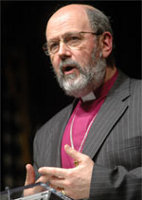In this instalment of the Nuts and Bolts series I thought I’d offer an outline of an issue that I was reminded of by some articles suggested to me recently. That issue is the Trinitarian notion of the subordination of the Son to the Father.
In one of these articles (by Ben Witherington), the writer denied that Christians ever believed in the eternal submission of Jesus the Son to his Father until 1977, when this “novel” suggestion was first made. I had to look twice to make sure I was reading it right! But there it was, this claim that simply flies in the face of historical fact. In context it was patently obvious that the goal of the article was not actually to explore or explain historical theology, but to make a claim for a position on a hot-button issue about gender and church (the claim was made that this doctrine was invented in 1977 to justify the oppression of women). The horse was before the cart, and theology in general was being re-read for the sake of a modern conflict. It’s the kind of thing that troubles me greatly, when people appear to approach an issue in theology with one eye looking back over their shoulder at a cultural issue where they feel obliged to come out on the “safe” side of an issue in the modern world, and the cultural pressure they are facing ends up controlling the theological outcome they reach. In light of the fact that such things go on all the time, I thought it would be a good idea to say a word or two to explain the historically orthodox view of the eternal subordination of the Son to the Father. Whether you believe it or not is another matter, as is the question of what implications you think it has, but all I really want to do here is to explain that it really is a historically orthodox perspective, and has very plausible biblical support.




 This episode asks the question: “What is Faith”? Is it, as some maintain, just believing things for no good reason? When Christian thinkers over the years have spoken of having faith, what have they been talking about? Listen and find out!
This episode asks the question: “What is Faith”? Is it, as some maintain, just believing things for no good reason? When Christian thinkers over the years have spoken of having faith, what have they been talking about? Listen and find out!
 I started the “Nuts and Bolts” series as a way of explaining some of the basic / common concepts in philosophy as well as theology at a fairly introductory level. Sometimes this is prompted by the realisation that online, often people refer to those concepts – even criticising or commending them – without actually having a firm grasp on them. It was an example like this that prompted me to start the series.
I started the “Nuts and Bolts” series as a way of explaining some of the basic / common concepts in philosophy as well as theology at a fairly introductory level. Sometimes this is prompted by the realisation that online, often people refer to those concepts – even criticising or commending them – without actually having a firm grasp on them. It was an example like this that prompted me to start the series. In the “Nuts and Bolts” series, I lay out some of the fundamental ideas and terms used in philosophy and theology for the lay person.
In the “Nuts and Bolts” series, I lay out some of the fundamental ideas and terms used in philosophy and theology for the lay person. Episode 42 presents the “minimal facts” approach to the resurrection of Jesus.
Episode 42 presents the “minimal facts” approach to the resurrection of Jesus.
